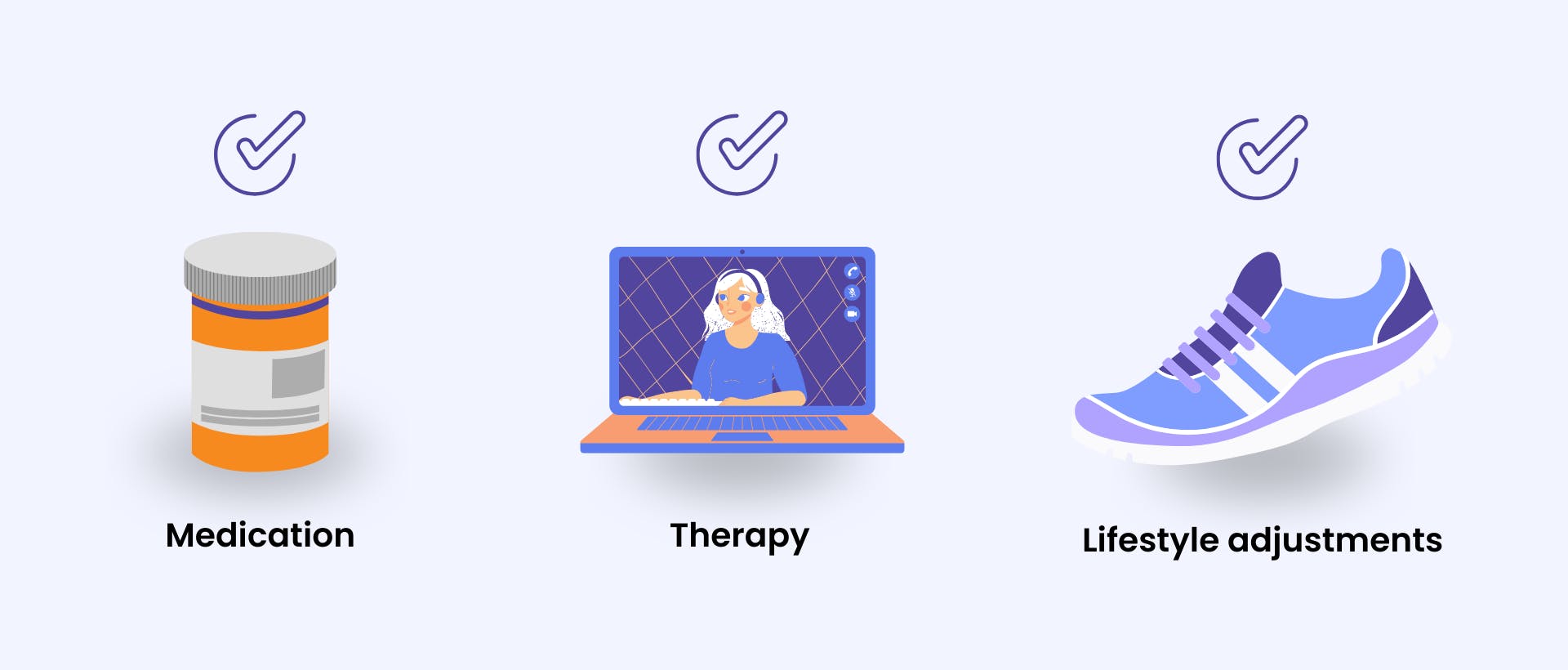People managing bipolar disorder may explore different options when seeking to achieve mental balance, including self-medication. With the rise in marijuana being used to treat other conditions, you may be curious and searching for answers about its effects on bipolar disorder.
But here's the blunt truth: Research overwhelmingly points to negative outcomes that outweigh any temporary relief its use could potentially provide.
Drawing on research, we’ll outline how smoking weed or taking edibles may affect symptoms, impact medication, and lead to other risks.
How marijuana affects bipolar symptoms
Bipolar disorder is characterized by significant mood swings, including manic highs and depressive lows. Introducing marijuana into this already unpredictable mix can make symptoms and episodes worse.
Marijuana makes bipolar symptoms worse
People with bipolar disorder may turn to marijuana in an attempt to relieve their symptoms, but it may have the opposite effect.
Mania or hypomania
During manic phases, dopamine levels are already high, contributing to heightened excitement and impulsivity. When THC (tetrahydrocannabinol) is introduced into your system, it can further increase dopamine levels, potentially intensifying these manic symptoms. This surge can lead to:
- An escalation in risk-taking behaviors
- Decreased need for sleep
- More pronounced mood swings
Heightened manic symptoms can disrupt the balance needed to manage bipolar disorder.
Depression
While it’s often associated with feelings of calm and relaxation, marijuana can also induce feelings of depression in certain individuals. This unexpected outcome is believed to arise from THC's effects on the brain's endocannabinoid system, which is instrumental in regulating emotions and stress.
THC's psychoactive properties can further imbalance critical mood-regulating neurotransmitters like serotonin and dopamine. Instead of alleviating the symptoms of bipolar depression, marijuana can intensify feelings of sadness, loneliness, and hopelessness, amplifying existing negative emotional states and thought patterns.
Anxiety
Marijuana can induce feelings of paranoia and anxiety in some individuals. For those with bipolar disorder, this can be particularly problematic as they often experience anxiety, too.
Overall, research suggests that bipolar symptoms will intensify or last longer with marijuana use. One study published in the Journal of Affective Disorders observed that some patients with bipolar disorder reported longer periods of worsened symptoms after marijuana use. Early research also indicates that there’s no advantage in using THC therapeutics for depression or CBD treatments for mania.
Why this is important: The unpredictability of marijuana's effects can make mood states more difficult to manage and predict, complicating treatment and recovery efforts.

Cognitive effects of marijuana use
One of the many concerning effects of marijuana use is its impact on cognitive functions like memory and attention, which can already be affected by bipolar disorder’s symptoms. Use can also influence coordination and reflexes.
These cognitive effects can exacerbate the challenges that bipolar disorder’s shifts in thinking and daily functioning present, including:
- Declined memory: Research indicates that marijuana use, particularly long-term or heavy use, can impair both short- and long-term memory.
- Reduced attention and concentration: Marijuana can also affect an individual’s ability to focus, pay attention, and process information efficiently.
The effects of marijuana also extend to psychomotor skills, impairing coordination and slowing reflexes.
For someone with bipolar disorder, these effects could make managing medication schedules more difficult, present challenges with school or work tasks, and increase their risk of accidents and injuries.
Marijuana interferes with medication
Individuals with bipolar disorder often rely on mood stabilizers like lithium or antipsychotics, which are processed by liver enzymes. The active compounds in marijuana, THC and cannabidiol (CBD), can interfere with these enzymes, potentially causing medications to reach dangerously high levels or fluctuate unpredictably in the bloodstream.
What this means: Elevated levels of mood stabilizers might lead to toxicity, while insufficient levels may fail to prevent mood swings. Additionally, marijuana use can intensify the sedative effects of bipolar medications, further impairing daily functioning.
To help avoid safety issues and unpredictable outcomes, individuals with bipolar disorder should discuss any marijuana use with their healthcare provider.
Marijuana use can lead to symptoms of psychosis
Some bipolar individuals are already at risk of experiencing psychosis. THC, the active component in marijuana, could trigger psychotic symptoms by interacting with the brain's cannabinoid receptors, affecting mood, perception, and cognition.
People with bipolar disorder have brain chemistry and mood regulation mechanisms that are already affected. Introducing THC can disrupt neural pathways further, increasing the risk of experiencing psychotic episodes for some. For those who experience psychosis, symptoms such as hallucinations, delusions, or disorganized thinking could worsen.
The association between marijuana use and psychosis is particularly significant for those with a family history of psychotic disorders.
Explore more: What You Should Know About Bipolar Psychosis
It can increase the frequency of bipolar episodes
Marijuana's impact on the brain can destabilize a person's mood, potentially triggering more frequent and intense episodes.
THC can disturb the brain's natural mood regulation by affecting neurotransmitters like dopamine and serotonin. This disruption can lead to more frequent and severe mood swings, amplifying the underlying mood instability associated with bipolar disorder.
By affecting the brain’s natural mood regulators, marijuana can lead individuals to cycle back and forth between mania and depression, which can make it challenging to manage bipolar disorder.
The bottom line: Marijuana's effects can make it more difficult to maintain emotional stability.

It may increase the risk of suicide
Marijuana use could worsen the condition by increasing suicidal thoughts and behaviors. Bipolar disorder inherently raises the risk of suicide due to its severe mood fluctuations. When marijuana is used, it can intensify depressive symptoms, making the lows feel even more profound and unbearable.
Why this is important: Major depressive episodes can be strongly linked to suicidal thoughts and behaviors.
Reliance on the substance for relief could also potentially lead to a vicious cycle of dependency and heightened despair and hopelessness, thereby elevating the risk of suicide.
Professional guidance is vital for managing the condition safely, and self-medication practices that could lead to more severe outcomes should be avoided.
Other effects of marijuana use
While marijuana can be regarded for its therapeutic properties, it's important to recognize that regular use has its own set of health risks, too. Specific examples of how marijuana can negatively impact someone's health include:
- Cardiovascular health: Marijuana use increases heart rate and blood pressure shortly after use, which can be particularly concerning for individuals with pre-existing heart conditions. Over time, this elevated strain on the cardiovascular system could increase the risk of heart-related issues.
- Respiratory problems: Smoking weed can harm the respiratory system, similar to how smoking cigarettes does. Regular marijuana smokers may experience chronic bronchitis, lung irritation, and an increased risk of respiratory infections.
It's critical to consider the added burden of managing a physical health complication on top of a mental health condition.
Can marijuana increase the chance of becoming bipolar?
While marijuana use has not been definitively linked to causing bipolar disorder, it can potentially act as a trigger for bipolar episodes due to its impact on the developing brain.
Studies show that using the drug can increase your chance of developing bipolar disorder as well as producing an earlier onset of the condition.
- Research published in JAMA Psychiatry found that marijuana use raises the risk of developing bipolar disorder, and its use also increases the risk of bipolar psychosis even more.
- A study in the Journal of Affective Disorders suggested that individuals who use marijuana may experience the onset of bipolar symptoms earlier than those who do not use the drug.
- Research in the American Journal of Psychiatry indicates that individuals with certain genetic markers for bipolar disorder are more susceptible to the mood-altering effects of THC, suggesting a genetic basis for the adverse outcomes observed in some cases.
Given the potential for the drug to interfere with bipolar disorder management, a careful and individualized approach to treatment and counseling is warranted. For individuals with a genetic predisposition to mental health conditions like bipolar, marijuana use should be approached with extreme caution.

How bipolar disorder is treated
Treating this disorder requires a multifaceted approach that typically involves a combination of medication, therapy, and lifestyle adjustments.
Medication
Bipolar disorder treatment typically includes mood-stabilizing medication tailored to each patient's unique needs to manage the cycles of highs and lows.
- Lithium and other anticonvulsants are common in stabilizing moods.
- Antipsychotics may be prescribed for episodes.
What works best can differ between people, but a licensed prescriber can help you develop a medication regimen that alleviates your bipolar symptoms.
Therapy
In-person or online therapy can help you recognize triggers and develop coping mechanisms without relying on substances like marijuana. It also supports the development of a healthy daily routine, which is crucial for managing the mood swings common in bipolar disorder.
Why this is important: Lowering the intensity of mood episodes could help reduce the desire to look to alternatives for symptom relief.
Lifestyle adjustments
Equally important are lifestyle adjustments that promote health and balance while managing bipolar symptoms. This can include having a set daily routine, getting regular exercise, eating a balanced diet, and getting enough sleep.
Since substance use can be a trigger, avoiding or limiting use may be vital to maintaining your mental and physical well-being.
The goal of treatment is to manage symptoms, reduce the frequency and intensity of mood swings, and help you lead a more stable and fulfilling life.
Learn more: Treatment Options for Bipolar Disorder
The risks outweigh potential benefits
Marijuana use complicates an already complex illness and treatment process. It can potentially lead to worse bipolar symptoms, medication issues, and an increased risk of suicide, psychosis, and other health problems.
If you haven’t been diagnosed but are wondering about your mental health status, the use of marijuana could potentially act as a catalyst, increasing the chances of the disorder’s onset.
People with bipolar are already at a higher risk of developing substance use disorder due to their brain's reward system's altered functioning. Adding marijuana into the mix can further increase the likelihood of developing this disorder.
The most important action you can take is to seek professional advice and have an open, honest conversation about the risks of marijuana use. With that knowledge, you can make informed decisions that lead to long-term mental wellness and stability.
If you’re managing bipolar disorder and weighing the effects of marijuana use, our care team — including licensed prescribers, online therapists, and care counselors — will work with you to address your mental health needs and substance use concerns.
With Cerebral, you can get personalized therapy and work with a licensed professional to manage your medication all from the comfort and privacy of your home.
Images by freepik, freepik, and freepik on Freepik.
The information in this blog is provided as a general educational resource only, and is not to be used or relied on for any diagnostic or treatment purpose. This information should not be used as a substitute for professional diagnosis and treatment and does not create any patient-physician relationship between you and Cerebral. Please consult your health care provider before making any health care decisions or to get guidance about a specific medical condition.

How to Support a Loved One with Bipolar Disorder

Bipolar vs. BPD: How To Tell The Difference

9 Common Triggers for Bipolar Episodes

Call 911 if you’re having a
mental health emergency
Text Home to 741-741 if you're in emotional
distress and need immediate support
Call or text 988 Suicide &
Crisis Lifeline. Chat service
is available at 988lifeline.org.